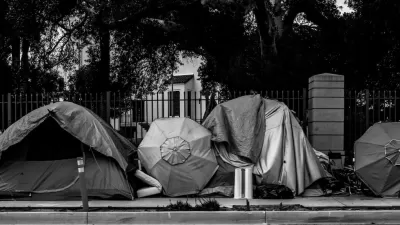David Simon believes the events depicted in his new HBO mini-series were the result of a history of systematic hyper-segregation in America. HUD Secretary Castro agrees.

Show Me a Hero, a new six-part HBO mini-series, chronicles the controversy surrounding a desegregation project in Yonkers, NY. The story is adapted from journalist Lisa Belkin's book of the same name. Creator David Simon (The Wire and Treme) and Academy Award-winning Director Paul Haggis (Crash) take on the challenge of heady themes—NIMBYism, federal housing policy, and school segregation—with cinematic flair, offering policy wonks a rare opportunity to enjoy a gripping television narrative that covers dense and difficult socio-economic and legal problems.
Simon describes how difficult it is to turn housing policy into good TV. "But if you can frame a story in terms of somebody’s victory or somebody’s tragedy or narrative, and you can make [people] care about that person, that’s always been an incredibly powerful rhetorical device in any argument. It just is...Otherwise, the problem becomes strangely ambiguous, regardless of how profound it is...I wish the facts themselves could argue sufficiently for people to behave."
The facts of the 1980's Yonkers case present a situation that was not then and is not today unique, but one that is rarely covered in the media or discussed by politicians. Libertarian critics argue that the court-ordered desegregation at the heart of the story was social engineering. Simon repeatedly addresses this in interviews. "The origins of segregated America happened not by chance, not by random patterns of housing," he states on CBS This Morning. In a meeting with HUD Secretary Julian Castro at the Urban Institute, and transcribed in an article by Emily Badger on The Washington Post's Wonkblog, Simon explains the limitations of the television format for exploring the full context of a political and social narrative with so many historical facets.
"We arrive way late [in the Yonkers story] to make the coherent case — which has been made in many other places — about how federal, state and local governments spent their resources, spent our resources to build a segregated society. We didn’t arrive at a Yonkers that magically self-segregated without a plan. We planned this society. We spent our money, our treasure, our tax dollars to achieve this over the course of decades...It was all a program that had widespread support — until people of color became the beneficiaries."
Secretary Castro and Simon agree that we are uncomfortable talking about the poor as much as we are about race. Concerns for the poor are absent from political debates and campaign trails. “It’s almost like all of us who do have a concern for the poor, and policies and investments that will help improve their lives, sometimes are inadvertently complicit in giving ground because we’re only speaking in terms of the 'middle class,'” Castro says at the Urban Institute event. “I guess I can say that because I’m not running for anything.”
An excerpt from the first chapter of Belkin's book describes the case and context for the show's story about the Yonkers mayor (played by Oscar Isaak) at the center of the political turmoil.
The case brought by the government in the late 1970s was United States of America and the Yonkers Branch of the National Association for the Advancement of Colored People, et al., AGAINST The Yonkers Board of Education, the City of Yonkers, and the Yonkers Community Development Agency, which "charged that race determined location and quality of education in Yonkers," writes Belkin in the first chapter.
"The plaintiffs went on to make the unprecedented argument that the reason the schools of Yonkers were segregated was because the housing of Yonkers was segregated. Black and Hispanic children went to the same few schools because black and Hispanic families were forced to live in the same few neighborhoods, and any judicial order to change the schools would also have to change the neighborhoods."
The courts agreed and the presiding judge ordered project housing to be built on the white, middle-class side of town. NIMBY calamity ensued.
FULL STORY: The creator of the Wire and Obama’s top housing official talk segregation and race

Maui's Vacation Rental Debate Turns Ugly
Verbal attacks, misinformation campaigns and fistfights plague a high-stakes debate to convert thousands of vacation rentals into long-term housing.

Planetizen Federal Action Tracker
A weekly monitor of how Trump’s orders and actions are impacting planners and planning in America.

San Francisco Suspends Traffic Calming Amidst Record Deaths
Citing “a challenging fiscal landscape,” the city will cease the program on the heels of 42 traffic deaths, including 24 pedestrians.

Amtrak Cutting Jobs, Funding to High-Speed Rail
The agency plans to cut 10 percent of its workforce and has confirmed it will not fund new high-speed rail projects.

LA Denies Basic Services to Unhoused Residents
The city has repeatedly failed to respond to requests for trash pickup at encampment sites, and eliminated a program that provided mobile showers and toilets.

Alabama Community Sues State DOT Over Flooding
Residents of Shiloh, Alabama want to hold the state department of transportation responsible for flooding caused by a highway expansion project.
Urban Design for Planners 1: Software Tools
This six-course series explores essential urban design concepts using open source software and equips planners with the tools they need to participate fully in the urban design process.
Planning for Universal Design
Learn the tools for implementing Universal Design in planning regulations.
planning NEXT
Appalachian Highlands Housing Partners
Mpact (founded as Rail~Volution)
City of Camden Redevelopment Agency
City of Astoria
City of Portland
City of Laramie




























